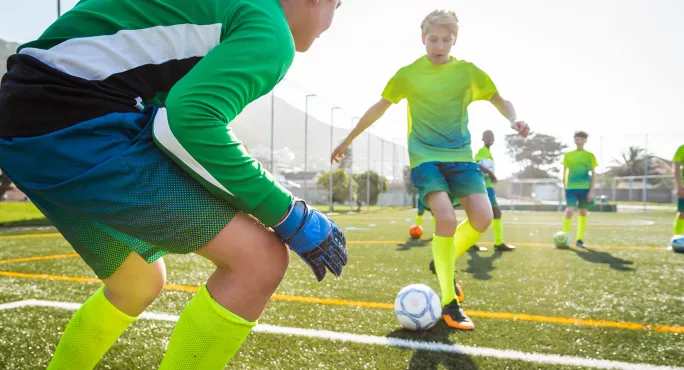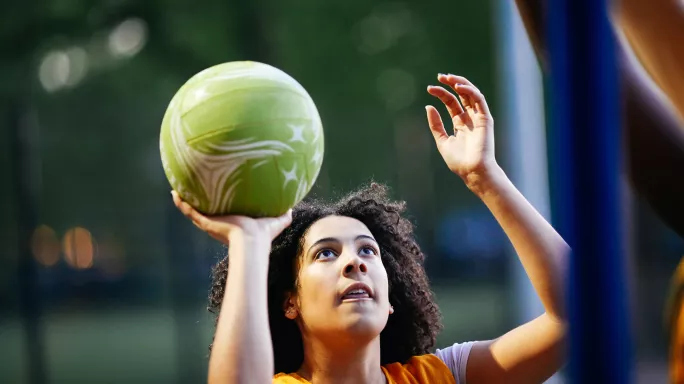- Home
- How team sports can protect pupil mental health
How team sports can protect pupil mental health

A knowledge-rich curriculum is the thing these days. And, for a lot of schools, that means pushing aside non-academic activities.
Some 38 per cent of secondary schools have cut timetabled PE for 14- to 16-year-olds since 2012, for example, despite depression and obesity rising within this age group over that period.
Physical activity can also have wide-ranging benefits within the brain, according to a new study from the US.
Quick read: ‘I’m 17 - most of my friends suffer from mental illness’
Quick listen: How to support pupils with eating disorders
Want to know more? The mental health pressures on teachers and pupils ‘are unsustainable’
Researchers found that engaging in team sports increased volume in the hippocampus, the region of the brain associated with memory and response to stress (suggesting that increased hippocampal volume leads to better memory consolidation and improves the ability to cope with stress).
They also found that team sports reduced depressive symptoms in adolescent boys, but not girls (although why this might be isn’t fully understood).
Team sports ‘tackle depression’
In the paper, the authors explain that previous research found a link between hippocampal volume and relational memory (the way different types of information are linked together and how relationships between them are identified).

This is, in turn, is associated with academic achievement.
The study set out to investigate the role of team sports in both the size of hippocampus and the impact on depressive symptoms in young people.
Lisa Gorman and her co-researchers examined data from a national sample of more than 4,000 children between the ages of 9 and 11, asked parents to complete questionnaires about depressive symptoms and participation in 23 sports, and scanned the children’s brains using MRI.
Gender differences
The results showed that hippocampal volume and involvement in sports were related in both boys and girls, as were depressive symptoms.
However, involvement in sports was only related to depressive symptoms in boys, with those who played sports experiencing fewer depressive symptoms.
The authors suggest that team sports may be more beneficial than other types of activities, including clubs, arts and music (although they admit that the benefits of these activities weren’t specifically examined, so we can’t be sure from this particular study).
This doesn’t mean that other activities are of no benefit; a 2015 study found that both team and individual sports were beneficial to boys’ overall wellbeing, while art activities were associated with higher wellbeing in girls. The issue here is that, while studies can identify gender differences such as these, explaining why they occur is problematic.
Boys seem to benefit more from team sports or those that involve structure, such as playing for a school team. Team sports also encourage social interaction, which could well be important when we consider that depression is often linked to feelings of isolation.
Correlation and causation
There are, of course, a few problems with the study. It shows a relationship between team sports, hippocampal volume and depressive symptoms, but doesn’t establish if one causes the other.
While the broad assumption is that playing team sports affects brain development and depressive symptoms, it’s equally likely that these differences could lead children to engage in team sports.
Despite this, however, the authors emphasise that either of these causal reasons is important and can provide new directions for work on how to improve and prevent depression in children.
Lessons to learn
Encouraging children to play team sports is perhaps the most obvious take-home message from the study, but it’s likely that other activities that involve structure and cooperation will have similar benefits.
This is particularly important for those children who find team sports stressful.
More widely, we might assume that by engaging boys in team sports, it’s possible to reduce symptoms of depression and raise academic achievement (if we assume that depression negatively impacts school success).
There is certainly a relationship between higher levels of anxiety and scores on high-stakes tests and that anxiety appears to place added pressure on working memory. Anxiety and depression also tend to appear together, although the causal direction is complex and likely to be reciprocal.
However, just to muddy the waters a little, a 2018 longitudinal study found that poor academic performance predicts depression symptoms.
Again, however, it’s difficult to establish if depression is the cause of low academic achievement or low academic achievement in causing depression (or the extent to which other factors play a role).
Sport, and in particular team sport, appears to have many benefits that include both improved mental health and, indirectly, academic achievement.
Unfortunately, such activities are still seen as less intellectual and are therefore likely to be pushed aside to make way for a more academic and knowledge-rich curriculum.
Marc Smith is a chartered psychologist and teacher. He is the author of The Emotional Learner and Psychology in the Classroom (with Jonathan Firth). He tweets @marcxsmith
Keep reading for just £1 per month
You've reached your limit of free articles this month. Subscribe for £1 per month for three months and get:
- Unlimited access to all Tes magazine content
- Exclusive subscriber-only stories
- Award-winning email newsletters



